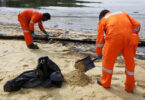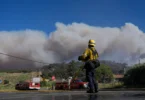ISTANBUL (Agencies): A”sheen” of fuel floating across the Mediterranean from a spill in Syria moved away from the north of the Mediterranean island of Cyprus on Wednesday thanks to shifting winds.
The government of the Turkish Republic of Northern Cyprus (TRNC) has been watching for days as an estimated 20,000 tons of fuel oil drifts toward the region’s northeastern tip.
Emergency workers tried to contain the spillage by roping it off with booms tossed from ships some 15 nautical miles (28 kilometers) off the shore.
Top ministers had warned that at least some of the oil could reach the scenic Karpaz peninsula on Friday.
But they sounded more positive after noticing that winds had begun pushing the oil back up north and away from the coast.
“The weather conditions continue to be in our favor,” TRNC Tourism and Environment Undersecretary Serhan Aktunç said.
He added that beachgoers should remain “vigilant” until Friday in case the winds change direction again.
“There is no problem in our sea now,” he said.
But Aktunç and other officials warned that marine life remained threatened because some of the oil had started to solidify and sink to the bottom of the Mediterranean Sea.
Officials from the Greek Cypriot administration on Wednesday reported detecting traces of oil some 30 nautical miles off its easternmost coast.
Turkey has already sent ships equipped with 1,100 meters of sea barrier, oil skimmers, oil absorbent pads and containment tanks to TRNC to deal with any contingency, Turkish Transport and Infrastructure Minister Adil Karaismailoğlu said.
Karaismailoğlu and Turkey’s Environment and Urbanization minister have also been advising TRNC about how to respond.
Officials in war-torn Syria have provided few details about what may have caused fuel to start leaking from the oil-operated Baniyas Thermal Station last week.
Syria’s Electricity Minister Ghassan al-Zamilhad told a pro-government newspaper Monday that the size of the leak ranged from two to four tons of fuel.






